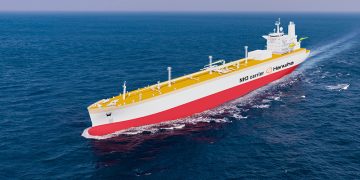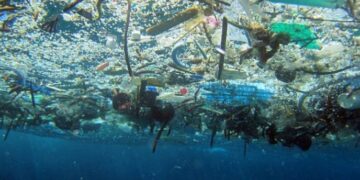The Marine Environment Protection Committee (MEPC) – 79th session starts today, 12 December, and will last until 16 December, discussing the most pressing issues regarding shipping’s decarbonization and overall energy efficiency.
Highlights:
- Designation of the Mediterranean Sea, as a whole, as an Emission Control Area for Sulphur Oxides and particulate matter;
- Revision of initial IMO GHG Strategy;
- Development of Mid-term measures including technical and economic measures;
- Proposals related to onboard CO2 capture;
- Report of fuel oil consumption data submitted to the IMO Ship Fuel Oil Consumption Database in GISIS (reporting year: 2021);
- Bunker fuel license; biofuels and NOx emissions; exhaust gas cleaning systems (EGCS);
- Various proposals for amendments and unified interpretations; consideration of various operational matters affecting implementation of the BWM Convention; approval of ballast water management systems;
- Proposal for designation of a particular sensitive sea area in the North-Western Mediterranean Sea to protect cetaceans from international shipping.
On the aftermath of COP26, MEPC 79 comes to further set the plan for shipping’s decarbonization. Under this scope, ICS stated:
We welcome signals that IMO member states now seem to be on track to adopt a similar target for international shipping, as well as a goal for 5% of the energy used by shipping to be produced from alternative fuels by 2030. But the hard work starts now
As it explains, many submissions on the table at the IMO include “ambitious but pragmatic decarbonisation solutions, including ICS’s recent “Fund and Reward proposal.”
What is more, ICS urged that “zero-carbon fuels must be available in significant quantities no later than 2030 if we’re to have any hope of hitting a 2050 target.”
Encouragingly, consensus is growing. Proposals show a groundswell of support for a flat rate contribution per tonne of CO2 emitted by ships on a global basis, to accelerate the production and uptake of these fuels
Revision of the initial IMO GHG Strategy
The MEPC 79 session will have for consideration a number of documents providing concrete proposals and comments related to the revision of the Initial IMO GHG Strategy. Some discussion will have taken place in the ISWG-GHG 13.
Mid-term measures including possible technical and economic measures
The MEPC 76 session adopted a work plan on the concrete way forward to make progress with candidate mid- and long-term measures, including measures to incentivize the move away from fossil fuels to low- and zero-carbon fuels to achieve decarbonization of international shipping.
The IWSG-GHG 13 will report on its progress in advancing towards the further development of a “basket of candidate mid-term measures” – integrating both various technical (for example, a GHG fuel standard and/or enhancement of IMO’s carbon intensity measures) and carbon pricing (for example, a market-based measure) elements. Further discussion is expected during the MEPC 79 session, including in the working group.
Impact assessments of candidate measures
MEPC is expected to finalize the revision of the Procedure on assessing impacts on States of candidate GHG reduction measures, taking into account the experience of the comprehensive impact assessment of the IMO short-term GHG reduction measure.
MEPC will also consider the methodology used for the impact assessment of the short-term measure. The Committee will also further discuss possible options of how to keep the impacts of a measure under review.
Lifecycle GHG assessment guidelines
The MEPC is expected to consider the further development of the draft guidelines on life cycle GHG intensity of marine fuels, taking into account the interim report of the Correspondence Group on Marine Fuel Life Cycle GHG Analysis.
ISWG-GHG 11 reported progress in developing draft Lifecycle GHG assessment guidelines (LCA guidelines) which will allow for a Well-to-Wake calculation, including Well-to-Tank and Tank-to-Wake emission factors, of total GHG emissions related to the production and use of alternative marine fuels.
Proposals related to onboard CO2 capture
The MEPC will consider proposals related to onboard CO2 capture. MEPC 78 discussed proposals related to on-board CO2 capture system and invited interested Member States and international organizations to submit further information and concrete proposals to future sessions.
Revision of the IMO Fuel Consumption Monitoring Data Collection System (IMO DCS)
ISWG-GHG 13 is expected to discuss a proposal on the future revision of the IMO Data Collection System of annual fuel consumption looking into possible future changes of the IMO GISIS reporting module, including enhanced transparency and additional reporting parameters.
Energy efficiency of ships
The MEPC will be invited to consider the report of fuel oil consumption data submitted to the IMO Ship Fuel Oil Consumption Database in GISIS (reporting year: 2021).
The MEPC will also consider proposed amendment to the 2018 Guidelines on the method of calculation of the Attained Energy Efficiency Design Index (EEDI) for new ships; and the report of the Correspondence Group on the Possible Introduction of EEDI Phase 4.
Air pollution prevention
The MEPC is expected to consider documents which have been submitted in relation to possible bunker fuel licensing system:the impact of the use of biofuels on NOx emissions ; and exhaust gas cleaning systems (EGCS).
Ballast water management
The MEPC is expected to consider proposals relating to:
- Application of the BWM Convention to ships operating at ports with challenging water quality.
- Temporary storage of treated sewage and grey water in ballast tanks.
- Amendments to the Form of the Ballast Water Record Book (BWRB) and further actions relating to the BWRB.
- Amendments to the example ballast water reporting form.
- Proposed unified interpretations to parts of the BWMS Code, regulation E-1 of the BWM Convention and the Form of the International Ballast Water Management Certificate.
- Application of the BWM Convention to specific ship types.
- Approval of ballast water management systems which make use of Active Substances based on the outcome of GESAMP-BWWG 42.
Mandatory garbage record books for smaller ships
The MEPC is expected to adopt amendments to MARPOL Annex V to make the Garbage Record Book mandatory also for ships of 100 gross tonnage and above and less than 400 gross tonnage.
This extends the requirement for mandatory garbage record books to smaller ships, which will be required to keep records of their garbage handling operations, namely discharges to a reception facility ashore or to other ships, garbage incineration, permitted discharges of garbage into the sea, and accidental or other exceptional discharged or loss of garbage into the sea.
Designating Mediterranean Sea as an Emission Control Area for Sulphur Oxides
The MEPC is expected to adopt amendments to designate the Mediterranean Sea, as a whole, as an Emission Control Area for Sulphur Oxides and particulate matter, under MARPOL Annex VI.
In such an Emission Control Area , the limit for sulphur in fuel oil used on board ships is 0.10% mass by mass (m/m), while outside these areas the limit is 0.50% m/m.
The MEPC will decide on the entry into force date. The amendment is expected to enter into force on 1 May 2024, with the new limit taking effect from 1 May 2025.
Designation of a particular sensitive sea area in the North-Western Mediterranean Sea to protect cetaceans from international shipping
The MEPC is expected to consider a proposal to designate a particular sensitive sea area in the North-Western Mediterranean Sea to protect cetaceans from international shipping. The proposal is submitted by France, Italy, Monaco and Spain.
The submitters state that the aim of the proposed NW Med PSSA is to protect cetaceans from the risk of ship collisions, ship-generated pollution and to increase awareness on a critically important area for the fin whale and the sperm whale.
The proposed PSSA encompasses the whole Pelagos Sanctuary and the Spanish cetacean corridor, which are already designated as Special Protected Areas of Mediterranean Importance (SPAMIs) under the Barcelona Convention and the UN Mediterranean Action Plan dedicated to the conservation of cetaceans.






























































